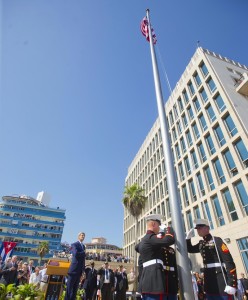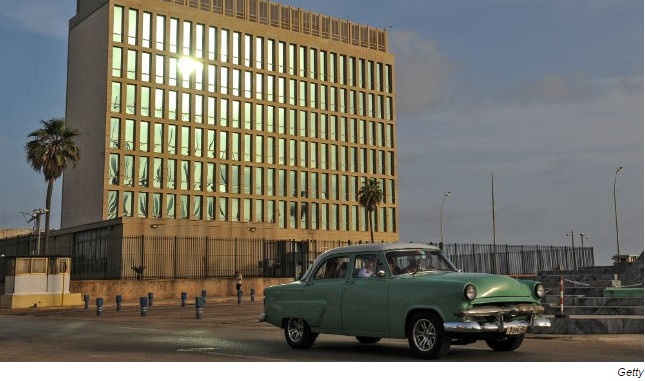With thaw in U.S. relations, Cuban baseball fears its uncertain future
By HARVEY ARATON - The New York Times
ALEX GOODLETT Yasiel Santoya of Cuba after a game between Cuba’s national baseball team and the New Jersey Jackals at Yogi Berra Stadium in Little Falls, N.J., June 28, 2016. Along the Cuban’s trip, despite many Cuban pronouncements regarding the warmth and hospitality they have encountered, there has been evidence of old-world stubbornness and tension between the two countries. (Alex Goodlett/The New York Times)
Posted: 6:00 a.m. Friday, July 1, 2016
LITTLE FALLS, N.J. — In a private interview after a news conference in which only baseball-related questions were requested, Higinio Vélez was asked one that veered well outside the preconditioned lines.
He did not scowl or storm off. He smiled and said, “That was a great question for the public, the one I was waiting for.”
Then Vélez, the president of the Cuban Baseball Federation and a former manager of its national team, gave an answer that was as paradoxical as it was
The federation, he said, welcomes Cuba’s thawing with the United States, hopes for more visits here like this month’s swing by the national team through the independent Can-Am League, and does not fear his country’s fertile developmental system being infiltrated by Major League Baseball.
The Cuban players, he said through an interpreter, “are living their dream — they are in Cuba because they want to be there.” He added, “We don’t worry about them wanting to come here.”
He said that, even as the country’s best players continue to land in the United States, shedding government and federation constraints however they can.
At that moment, “here” was the Yogi Berra Museum and Learning Center, on the campus of Montclair State University, where a Monday news conference preceded a three-game series between the Cuban team and the New Jersey Jackals at the adjacent stadium, also named for Berra. In the opener, on Tuesday night, the Cubans won a 9-4 rain-shortened seven-inning contest before a sparse crowd.
The Jackals series is the conclusion of a 19-game swing by the Cubans against the six Can-Am League teams — three in Canada, where the tour was conceived, and three in northern New Jersey and Rockland County, New York.
Along the way, despite many Cuban pronouncements of the warmth and hospitality they have encountered, there has been evidence of old-world stubbornness, of the status quo.
While the Cubans — who said they brought about half their front-line national team players — were losing seven of 10 games in Canada before reeling off seven straight victories south of the border, the star infielder Yulieski Gourriel, 32, has been auditioning for major league clubs after defecting in February.
And during a shopping trip last week after a series in New Jersey against the Sussex County Miners, Lázaro Ramirez, a 24-year-old outfielder, slipped away from the Cuban team and has not returned.
The apparent defection led to a tense weekend in Rockland County, where the Cuban players snubbed Orlando Hernandez, known as El Duque, the Cuban pitcher with the high leg kick whose harrowing 1997 exit by boat led to a flamboyantly productive run with the New York Yankees.
“No one say hi to me, no one shake my hand,” a deflated Hernandez told reporters after throwing out the first pitch to the former Yankees catcher John Flaherty, who is now a limited partner of the Rockland Boulders.
The team invited Hernandez to launch the weekend series on Friday night, with 75-year-old Luis Tiant, a Cuban legend and Hernandez’s stylistic ancestor, tapped for the Sunday series closer.
Shawn Reilly, the Boulders’ executive vice president and general manager, said Cuban officials expressed their displeasure over Hernandez’s presence, especially since the game was being televised by ESPN Deportes.
“They sat down in my office and were adamant that El Duque’s first pitch was not to be broadcast back to Cuba,” Reilly said. He added that while the weekend was a box office success, and that “we’d love to play them again,” it was “a headache, high maintenance.”
The Boulders, Reilly said, had to pick up the costs for heightened security after Ramirez’s disappearance. The Cubans’ per diem demands were much higher than Can-Am League norms. And in contrast to the relaxed conventions of independent baseball, the Cuban players were marched from one place to the next by delegation officials, with little time for mixing with fans, many of whom, Reilly said, were Cubans and other Hispanic nationalities.
When the Cuban team then arrived in New Jersey on Monday, a trip to Union City, long identified with Cuban-Americans, was canceled because of security concerns. The Cuban team also rejected a planned boat tour around Manhattan before later agreeing to go.
Michel Laplante, the president of the Can-Am League’s Quebec Capitales and the inspiration for the Cuban tour, said it was wrong to interpret the national team’s behavior as standoffish. Across the political and cultural divide, from his Canadian perspective, it is more complicated than that.
“When you sit down with them, and they explain their position, sometimes you’ll say, oh, that makes sense,” Laplante said. In Quebec City, for instance, there was a brief uproar in Cuba when the team lost three of four games. There was little tolerance back home for news of tourist events by the Cuban team when competitive national pride was at stake.
Laplante, who spent most of a nine-year minor league career in the Pittsburgh Pirates organization, forged a relationship with the Cuban federation several years ago, shepherding a group of Canadian boys to the Caribbean island to learn the game in a different, less-pampered teaching environment. He approached the Cubans with a more radical idea in 2014.
“I said, ‘I am the president of a team in Quebec City — why not send someone to play for us?’” Soon after, Yuniesky Gourriel, the older and less talented brother of the most recent star defector, became the first Cuban ballplayer in more than half a century to play professionally in North America with the Cuban government’s permission.
Three more Cubans arrived in Quebec City last season. Heriberto Suárez, Cuba’s baseball commissioner, told Canada’s Globe and Mail newspaper, “We have set a precedent with the contracts we have done.”
Was he suggesting that Cuba might soon allow its players free movement to the United States? There is no way to know, but that would end the stream of embarrassing defections that have resulted — both countries agree — in potentially dangerous human trafficking.
From the Cuban perspective, Laplante said, there is also a belief that many of its players are promised eventual riches — “Yoenis Cespedes money,” he said — they will never earn when they wind up maxing out in the minor leagues.
A Cuban defection was nothing new for the Boulders’ Reilly, who was with the Niagara Falls Rapids in 1993 when the team hosted the baseball tournament for the World University Games, which were held in Buffalo.
“One of their players climbed over a fence, got into a car and that was that,” he said.
The player was Rey Ordóñez, who signed with the New York Mets. Twenty years later, Ordóñez returned to Cuba to a hero’s welcome, which made the treatment of El Duque all the more bewildering to Reilly, who thought he had scored a promotional coup.
When he picked up Tiant at the airport for Sunday’s game, he mentioned what had happened with El Duque. Tiant, who did not have to defect to sign with Cleveland in 1961, was treated royally by the Cubans when Reilly took him to their clubhouse. He told Reilly there often are ulterior motives with the Cubans, hidden agendas.
“They don’t want to open it up,” Reilly said Tiant told him, suggesting the federation officials do fear becoming another Dominican Republic, where major league teams mine talent with their own in-country academies.
Concurring on this point was Roberto González Echevarría, an expert in Latino literature and culture, a Yale professor and a keen observer of his native Cuba’s baseball program. Since the Can-Am League tour began, he has been scouring Cuban blogs, trying to figure out why the federation agreed to compete in a league that is considered on a par with high-level Class A ball.
On Monday, Suárez, the Cuba commissioner, said the national team had no major tournament this summer and desired an international trip before next spring’s 2017 World Baseball Classic. Echevarría, a longtime critic of the Cuban government, was not convinced.
“Maybe it’s to keep the players happy because they are not really getting paid,” he said. “To me, it shows there’s a great deal of confusion, even dissension, within the Cuban baseball establishment because the opening with the U.S. is really going to affect it to the core.”
While Cuban government detractors hope that the country’s baseball federation will ultimately have to accept the tide of change, and that Cuban defectors might eventually play for their country in the World Baseball Classic, Vélez’s immediate plan — more goodwill barnstorming — sounded much less ambitious.
“It’s an issue with the government,” he said. “If it were up to me, we’d be here, traveling every weekend.” Asked about Lázaro Ramirez and more potential defections, he said, “If we were afraid of that at all, we wouldn’t even be here.”
One Cuban player spoke at Monday’s news conference: Yorbi Borroto, the team captain, a talented shortstop some think could someday play in the majors. Asked about the Cubans who have struck it rich in America, he said: “They all come from the same school of hard knocks, from the same plan.”
He claimed not to have much information on how they were doing (or how much they were earning), but he wished them long careers. His personal ambition was to simply continue “traveling and playing with other countries.” The plan was vague enough so that the two Cuban officials, Vélez and Suárez, standing nearby, could listen in, and approve.



 Cuba. I don’t think I’ve ever gone a day in my life without hearing or thinking about it. My homeland. The country that my grandparents, aunts, uncles, and cousins always talk about with sad eyes but happy memories.
Cuba. I don’t think I’ve ever gone a day in my life without hearing or thinking about it. My homeland. The country that my grandparents, aunts, uncles, and cousins always talk about with sad eyes but happy memories.  Leaders of the U.S. and Cuba last week took one more step on the road to full normalization of relations that began in late 2015.
Leaders of the U.S. and Cuba last week took one more step on the road to full normalization of relations that began in late 2015.